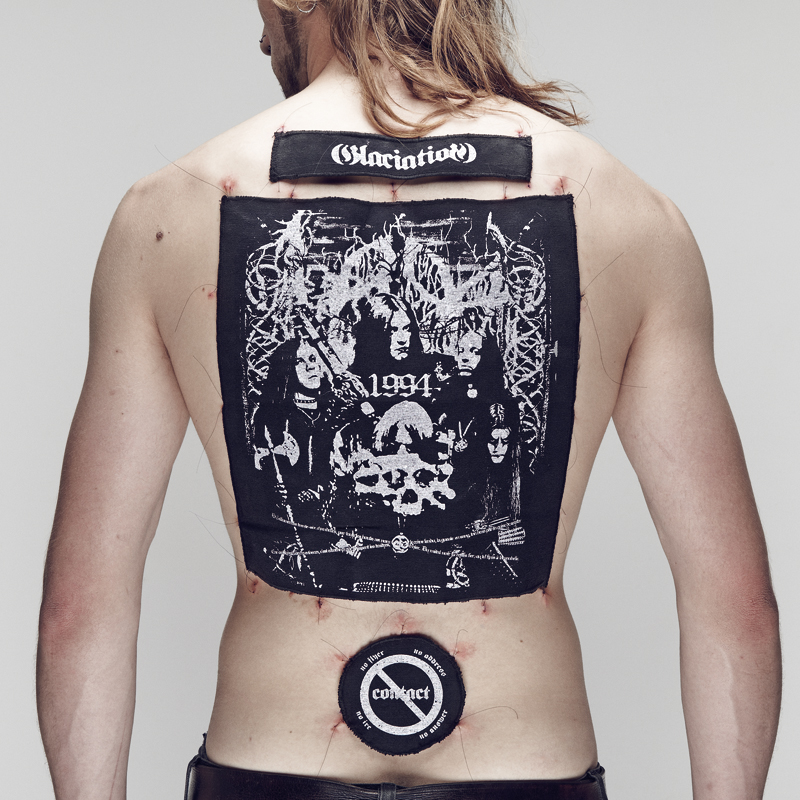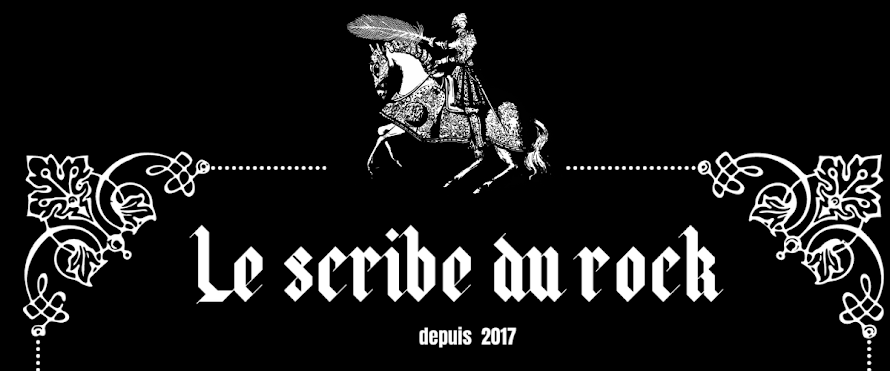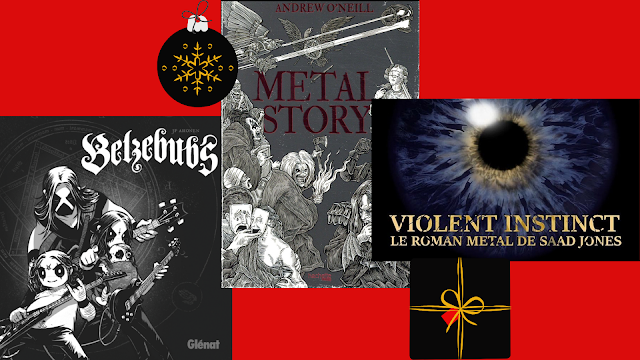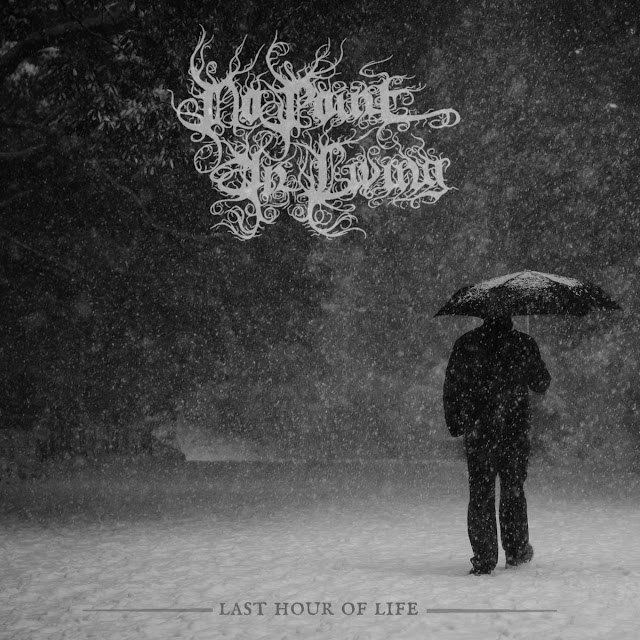ULTIME ECLAT : GLACIATION - Entretien avec Hreidmarr et Arnhwald - Français/English
Glaciation fait partie de ces groupes français qui nous font penser que l'avenir du Black Metal, genre saturé par nombre de sorties inutiles, ne peut se conjuguer qu'avec un souci permanent de qualité et d'originalité. Hreidmarr et Arnhwald répondent à mes questions a quelques jours de la sortie du troisième album du combo : Ultime Eclat. Un disque qui s'annonce comme un des événements notoires de l'année en matière de Metal français. Que ceux qui croient que le Black Metal n'est qu'une vague resucée de sonorités issues des années 90 en prenne de la graine ! Le Scribe

Merci à vous de bien vouloir répondre aux questions du Scribe !
Commençons par évoquer le présent et le futur du groupe si vous le voulez bien...Je sais que vous êtes en train de finaliser votre nouvel album qui s'annonce comme un événement, pouvez-vous nous en dire un peu plus ? (NdS : l'album était encore inédit au moment de cette interview)
Hreidmarr : Je serai très bref. Nous avons commencé à travailler sur cet album fin 2016, et en avons bouclé les derniers détails au début décembre 2019, ce fût donc un processus relativement long, mais justifié par le fait que depuis "Sur les falaises de marbre", le groupe a connu d'énormes bouleversements, et que notre niveau d'exigence est monté d'un cran certain.
J'ai eu la chance d'écouter deux titres du nouvel opus, “Le Rivage” et “Acta Est Fabula”. Deux titres incroyables ! Épiques, puissants, gardant l'énergie du Black Metal tout en proposant quelque chose de frais et d'inédit. Doit-on s'attendre à des morceaux de cet acabit tout au long de l'album ?
Hreidmarr : Oui, je pense que l’album est cohérent, nous nous sommes efforcés de rester dans une certaine continuité par rapport au précédent, tout en essayant de nouvelles choses. Il était important pour nous que ce disque soit un bloc massif déroulant une cinématique précise de son début jusqu’à sa fin, mais que dans le même temps, chaque morceau en soit un vrai, réellement écrit, et puisse être écouté indépendamment du reste. En cela, chaque morceau à son petit “twist” et son côté “remarquable”. C’est un équilibre difficile à trouver.

Le son est dantesque, et les chœurs ajoutent une dimension grandiose à votre musique. Comment s'est déroulé le processus de composition, et d'ailleurs qui intervient sur ces titres ?
Arnhwald : La composition a été réellement collégiale. Pour la musique, trois compositeurs sont intervenus. A partir des brouillons proposés par les uns et les autres, je me suis occupé d’assembler et d’arranger les morceaux. Pendant la phase d’enregistrement, chacun a pu apporter son grain de sel, et pendant la phase de production/mixage, le travail a été affiné grâce à la participation de chacun. Nous avons enregistré les instruments en live, ce qui a permis une vraie interactivité entre les musiciens, et l’essai aussi de plusieurs petites variantes, parmi lesquelles sélectionner ce qui semblait le plus pertinent.
En ce qui concerne les textes, c’est à peu près la même chose. Quatre plumes cette fois-ci, et quelques allers-retours.
Hreidmarr et moi avons chapeauté le travail mais dans les faits, ce disque est réellement le fruit d’un effort de groupe.
“Acta Est Fabula” a un côté “biblique” dans sa dimension prophétique. Est-ce la naissance de l'antéchrist qui va régir ce monde ? Ce titre a un côté presque “chanson” dans les vocaux, c'est fascinant ! Pouvez-vous nous en dire plus sur votre inspiration ?
Arnhwald : J’ai écrit les textes à partir d’une image et d’une idée. Et si la Fin des Temps avait déjà eu lieu, et que les décors de mort de la ville contemporaine, avec son cortège d’industries, de zones commerciales, d’urbanisme atroce, avec ses hordes d’humains zombifiés, ne croyant plus en rien, pas même à leur propre existence, ses sols empoisonnés, son air empesté, son univers mental et spirituel vide de toute idée de l’absolu, n’était que la figuration omniprésente de cet Armageddon mou ? L’idée de départ est là. Nous avons ajouté un intermède particulièrement lugubre que Katia, notre bassiste, a écrit et interprété au piano, et sur lequel se greffe presque miraculeusement un extrait d’une chronique radiophonique d’Antonin Artaud qui avait compris, lui, que le diable moderne n’a rien de folklorique, mais qu’il se terre profondément au cœur du prométhéisme technique.

Glaciation avait déjà sorti des trésors : en 2012 vous avez commencé avec un Ep nommé 1994. Déjà, vous visiez haut, avec de longs titres épiques et puissants qui réunissaient la crème du BM de France. A l'époque vous étiez plus foncièrement black metal, non ?
Arnhwald : 1994 se voulait un hommage. Mais il y a un moment où il est nécessaire de dépasser l’obsession nostalgique et faire fructifier l’héritage. Le EP contenait lui-aussi (et je me rappelle avoir lu quelques chroniques qui le déploraient) quelques étrangetés qui tranchaient avec l’horizon d’attente, des incursions dans le shoegaze par exemple.

Hreidmarr : Il faut considérer aussi que sur le EP, le line-up était complètement différent, et n’incluait aucun des membres actuels.
De toutes façons le titre 1994 annonçait bien la couleur. Quel est votre sentiment sur cette époque désormais lointaine, sur Euronymous et la scène de l'époque ?
Hreidmarr : Tout ce que je pourrais en dire a déjà été dit et répété à l’envi: les fanzines, le courrier, les flyers, les IRCs, les démos et l’absence d’internet… Absolument tout était différent, y compris et surtout le rapport à la musique, l’implication totale, l’immersion, l’engloutissement même, en opposition au côté dilettante et totalement superficiel actuel… Euronymous et beaucoup d’autres sont morts de ce dévouement absolu. Ceux qui restent en portent les stigmates à vie. Je doute qu’il en soit ainsi pour les crétins à bonnets actuels qui se disent “black metal” tout en s’offusquant du moindre propos ou comportement violent ou “extrême”... Il m’arrive évidemment d’être nostalgique, et la musique de Glaciation porte d’ailleurs en elle de manière quasi immanente cette atmosphère de fin de bataille, mais je préfère vivre dans le présent, et regarder bien en face les années d’acier qui s’annoncent.
Arnhwald : il y a sans doute quelque chose à conserver de cette époque pionnière : l’idée que cette musique n’est pas ordinaire, et n’est pas destinée à plaire, mais à fasciner.
Valnoir, les membres d'Alcest, RMS Hreidmarr, François de Diapsiquir, Hugo de Necroblaspheme et d'autres, comment réunit-on un tel “casting” de luxe et comment travailler ensemble ? Les égos n'ont-ils pas été durs à gérer ?
Hreidmarr : J’aurais du mal à répondre. En ce qui me concerne je suis arrivé dans le groupe après le premier EP, au début du processus de composition du premier album. Valnoir n’était déjà plus là. Quant-aux membres d’Alcest, il s’agissait plutôt de guests que de membres à part entière. Ce que je peux dire en revanche, c’est que le but n’a jamais été de monter un “all-star band”, tout le monde se connaissait déjà, et à chaque fois que quelqu’un a contribué de près ou de loin à Glaciation, cela s’est fait naturellement, en piochant dans le cercle des musiciens proches. Cela s’est également vérifié après les “Falaises”, quand j’ai pris la décision de recruter un nouveau line-up, alors qu’à ce moment le groupe était moribond, j’ai tout simplement contacté des gens avec qui j’avais des affinités à la fois personnelles et musicales, comme Arnhwald, qui eux-mêmes m’ont présenté d’autres personnes qu’ils estimaient, et ainsi de suite.
Arnhwald : Sur le fond, lorsque l’on décide de former un groupe pour jouer cette musique là, et même il est sans doute difficile de faire abstraction de la force des personnalités individuelles, ce n’est pas pour mettre son petit ego en valeur, mais avant tout pour le soumettre à des exigences esthétiques. Le groupe aujourd’hui fonctionne : chacun sait ce qu’il peut et doit apporter à l’oeuvre d’ensemble, et je dois dire qu’”Ultime Éclat”, de ce point de vue, fut un album assez facile à réaliser dans la mesure où chacun s’est impliqué à fond avec pour seul dessein de tout donner à la musique.
“Sur les falaises de marbre” votre précédent album, fut un choc musical et esthétique dans le landernau du Black français. Pouvez-vous nous parler de la composition de cet album ? De ses thématiques ?
Hreidmarr : Les thématiques me paraissent claires, et restent inchangées sur le nouvel album, sur lequel je préfère d’ailleurs me concentrer à l’heure actuelle.

Le nouvel album doit sortir quand ?
Hreidmarr : Le 27 février sur Osmose.
Pouvez-vous nous ajouter une info ou deux à savoir sur Glaciation ?
Hreidmarr : Non.
Merci a vous !

Glaciation is one of those French bands that make us think that the future of Black Metal, a genre saturated by many useless releases, can only be combined with a permanent concern for quality and originality. Hreidmarr and Arnhwald answer my questions a few days before the release of the combo's third album: Ultime Eclat. An album that promises to be one of the most notorious events of the year in French Metal. Let those who believe that Black Metal is just a resurrected wave of sounds from the 90s take some seed! The Scribe

Thank you for answering the Scribe's questions!
Let's start by evoking the present and the future of the band if you want to...I know you're finalizing your new album which is going to be an event, can you tell us a little bit more about it ? (NdS: the album was still unreleased at the time of this interview)
Hreidmarr: I'll be very brief. We started working on the album at the end of 2016, and finished the final details in early December 2019, so it was a relatively long process, but justified by the fact that since "On the Marble Cliffs", the band has undergone huge changes, and our level of demands has gone up a notch.
I had the chance to listen to two tracks from the new opus, "Le Rivage" and "Acta Est Fabula". Two incredible tracks! Epic, powerful, keeping the energy of Black Metal while offering something fresh and new. Should we expect songs like this throughout the album?
Hreidmarr: Yes, I think the album is coherent, we tried to stay in a certain continuity with the previous one, while trying new things. It was important for us that this record is a massive block with a precise cinematic from the beginning to the end, but at the same time, each track is a real one, really written, and can be listened to independently from the rest. In this, each track has its little "twist" and its "remarkable" side. It's a difficult balance to find.

Arnhwald: The composition was really collegial. For the music, three composers were involved. From the drafts proposed by each of them, I took care of assembling and arranging the pieces. During the recording phase, each one was able to bring his own grain of salt, and during the production/mixing phase, the work was refined thanks to everyone's participation. We recorded the instruments live, which allowed a real interactivity between the musicians, and we also tried out several small variations, from which to select what seemed most relevant.
As far as the lyrics are concerned, it's more or less the same thing. Four feathers this time, and a few back and forth.
Hreidmarr and I were in charge of the work but in fact, this record is really the fruit of a group effort.
"Acta Est Fabula" has a "biblical" side in its prophetic dimension. Is it the birth of the antichrist who will rule this world? This title has an almost "song" side in the vocals, it's fascinating! Can you tell us more about your inspiration?
Arnhwald: I wrote the lyrics from an image and an idea. What if the End of Days had already taken place, and the death scenes of the contemporary city, with its procession of industries, commercial zones, atrocious urban planning, with its hordes of zombified humans, no longer believing in anything, not even in their own existence, its poisoned soils, its poisoned air, its mental and spiritual universe devoid of any idea of the absolute, was just the omnipresent figuration of this soft Armageddon? The original idea is there. We have added a particularly gloomy interlude that Katia, our bass player, wrote and played on the piano, and to which is grafted almost miraculously an excerpt from a radio chronicle by Antonin Artaud, who had understood that the modern devil has nothing folkloric about him, but that he hides deep down in the heart of technical Prometheism.

Arnhwald: 1994 was meant to be a tribute. But there's a time when you have to go beyond the nostalgic obsession and make the legacy grow. The EP also contained (and I remember reading some reviews that deplored it) some strangeness that contrasted with the horizon of waiting, incursions into shoegaze for example.

Anyway, the title 1994 was a good indication of the colour. What's your feeling about this now distant time, about Euronymous and the scene at that time?
Hreidmarr: Everything I could say about it has been said over and over again: the fanzines, the mail, the flyers, the IRCs, the demos and the lack of internet... Absolutely everything was different, including and especially the relationship to the music, the total involvement, the immersion, the engulfing even, as opposed to the dilettante and totally superficial side of things today... Euronymous and many others died from this absolute dedication. Those who remain bear the stigmata for life. I doubt it will be the same for the current "black metal" morons who call themselves "black metal" but are offended by the slightest violent or "extreme" comment or behaviour... Of course, sometimes I can be nostalgic, and Glaciation's music carries this end of battle atmosphere almost immanent in it, but I prefer to live in the present, and to face the steel years ahead.
Arnhwald: There is undoubtedly something to be retained from this pioneering era: the idea that this music is not ordinary, and is not intended to please, but to fascinate.
Valnoir, the members of Alcest, RMS Hreidmarr, François de Diapsiquir, Hugo de Necroblaspheme and others, how does one bring together such a luxury "casting" and how do you work together? Weren't egos hard to deal with?
Hreidmarr: I would have a hard time answering. As far as I'm concerned, I joined the band after the first EP, at the beginning of the composition process of the first album. Valnoir was already gone. As for the members of Alcest, they were rather guests than full members. What I can say on the other hand, is that the goal was never to set up an "all-star band", everyone already knew each other, and each time someone contributed in any way to Glaciation, it was done naturally, by tapping into the circle of close musicians. This was also true after the "Cliffs", when I made the decision to recruit a new line-up, when at that time the band was dying, I simply contacted people with whom I had both personal and musical affinities, like Arnhwald, who themselves introduced me to other people they liked, and so on.
Arnhwald: Basically, when you decide to form a band to play this music, and even it's probably difficult to ignore the strength of individual personalities, it's not to enhance your small ego, but above all to subject it to aesthetic demands. The band works today: everyone knows what he can and must bring to the overall work, and I must say that "Ultime Éclat", from this point of view, was a fairly easy album to make as long as everyone got involved to the fullest extent with the sole aim of giving everything to the music.
"Sur les falaises de marbre", your previous album, was a musical and aesthetic shock in the landernau of the French Black. Can you tell us about the composition of this album? About its themes?
Hreidmarr: The themes seem clear to me, and remain unchanged on the new album, which I prefer to concentrate on at the moment.

When is the new album due out?
Hreidmarr: February 27th on Osmose.
Can you add a couple of things to know about Glaciation?
Hreidmarr: No.
Thanks to you!








